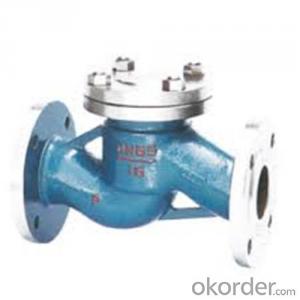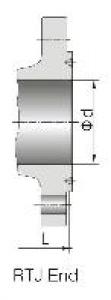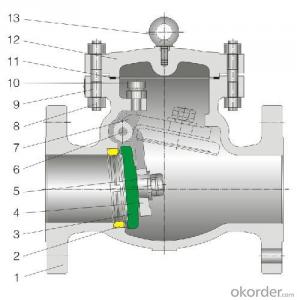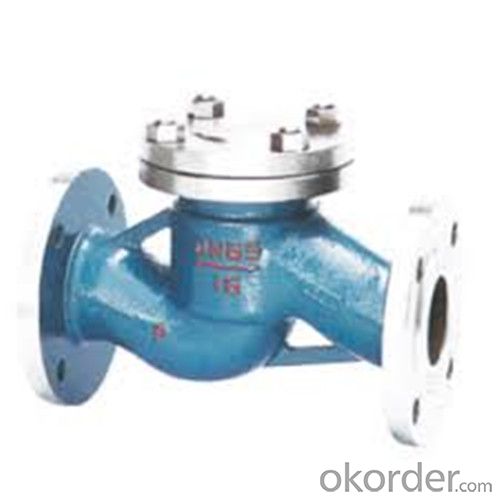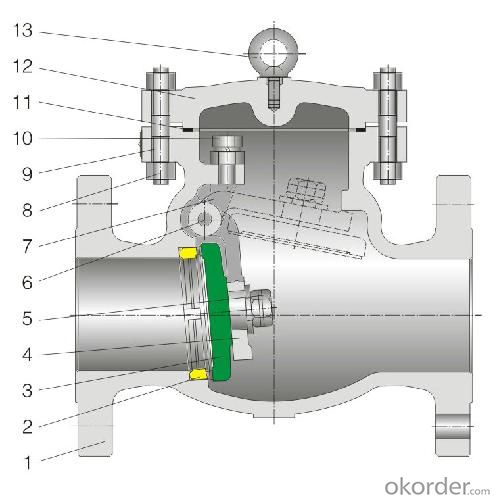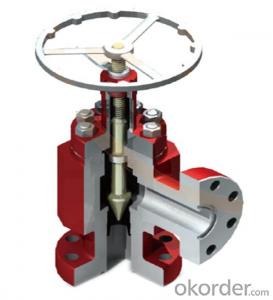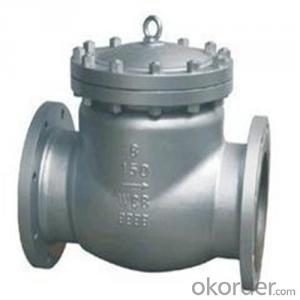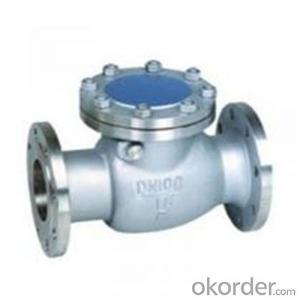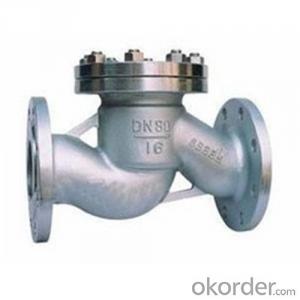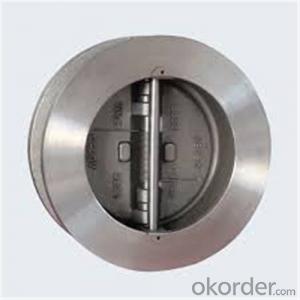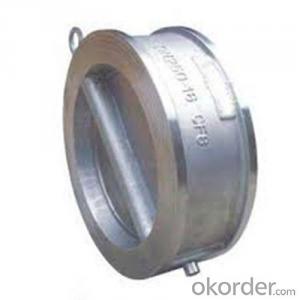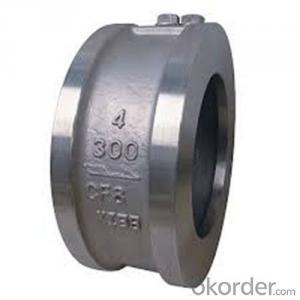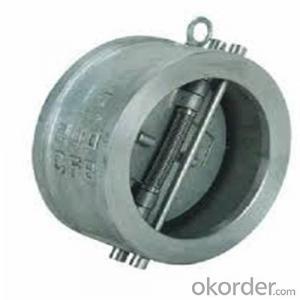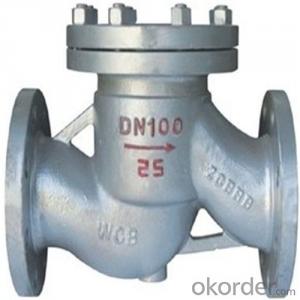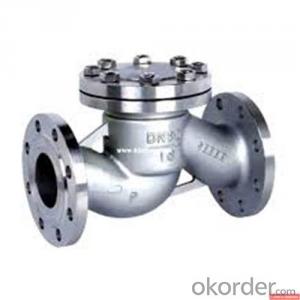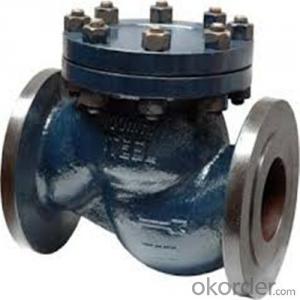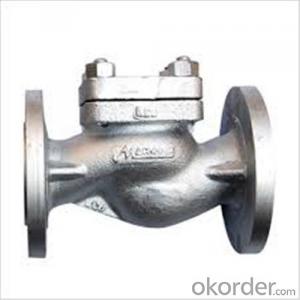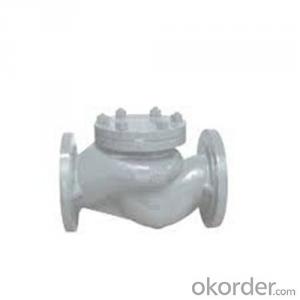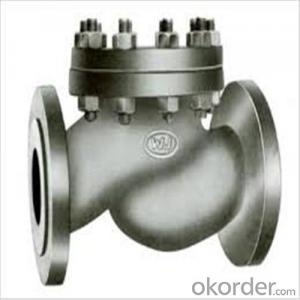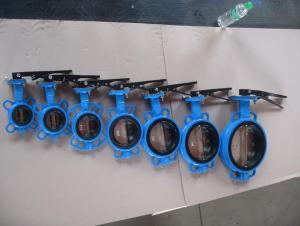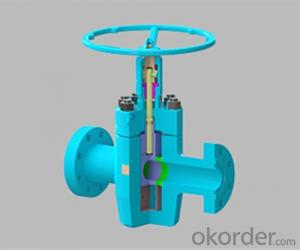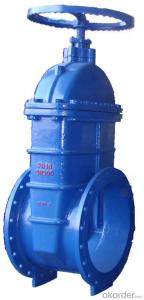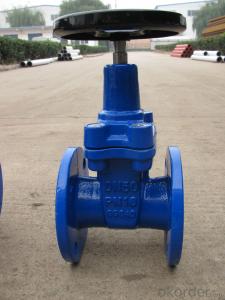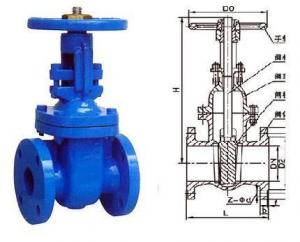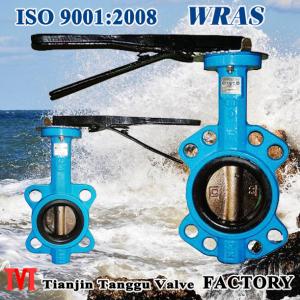API Cast Steel Lift Check Valve 300 Class
- Loading Port:
- Shanghai
- Payment Terms:
- TT OR LC
- Min Order Qty:
- 10 pc
- Supply Capability:
- 100 pc/month
OKorder Service Pledge
OKorder Financial Service
You Might Also Like
API Cast Steel Lift Check Valve 150 Class
The features of Cast Steel Lift Check Valve
Bolted Bonnet;Swing and lift disc;Metallic seating surfaces.
Body and Bonnet Connection of Cast Steel Lift Check Valve:
The body and bonnet of Class150~Class900 check valves are usually with studs and nuts.And the body and bonnet of Class1500~Class2500 check valves are usually of pressurized seal design.
Body-To-Bonnet Joint of Cast Steel Lift Check Valve:
Stainless steel + flesible graphite wounded gasket is used for Class 150 and Class 300 check valve;Stainless steel + flexible graphite wounded gasket is used for Class 600 check valve,and joint gasket is also optional for Class 600 check valve;Ring joint gasket is used for Class900 check valve;Pressurized seal design is used for Class 1500~Class 2500 check valves.
Seat of Cast Steel Lift Check Valve:
For carbon steel check valve,the seat is usually forged steel.The sealing surface of the seat is spray welded with hard alloy specified by the customer.Renewable threaded seat is used for NPS<10 check="" valves="" and="" welded="" on="" seat="" can="" be="" also="" optional="" if="" being="" requested="" by="" the="" customer.welded="" is="" used="" for="" nps="">12 crbon steel gate valves .Forstainless steel check valve,integral seat is usually adopted ,or to weld hard alloy directly integrally.Threaded or welded on seat is also optional for stainless steel check valve if being requested by the customer.
Parameter of Cast Steel Check Valve:
Standard Criteria | ASME/ANSI/API customize |
Pressure Rating | 150 Class 300 Class 600 Class 900 Class 1500 Class 2500 Class customize |
Valve Size | 50 mm 65 mm 80 mm 100 mm 125 mm 150 mm 200 mm 250 mm 300 mm 350 mm 400 mm 450 mm 500 mm 600 mm 650 mm 700 mm 750 mm |
2 inch 2.5 inch 3 inch 4 inch 5 inch 6 inch 8 inch 10 inch 12 inch 14 inch 16 inch 18 inch 20 inch 24 inch 26 inch 28 inch 30 inch customize | |
Actuator | Automatic customize |
Connection | Butt Welding Flange RF Flange RTJ customize |
1-Body Material | A216 WCB A351-CF8 A351-CF8M customize |
2-Seat ring | A351-CF8 A351-CF8M A105+13Cr Tool Steel+A105 customize |
3-Disc | Tool Steel+A216 WCB A351-CF8M A351-CF8 A216 WCB+13Cr customize |
4-Arm | A351-CF8 A216 WCB A351-CF8M customize |
5-Nut | A194 8M A194-8 A194 2H customize |
6-Arm pin | A182-F6a A182-F316 A182-F304 customize |
7-Yoke | A351-CF8 A351-CF8M A216 WCB customize |
8-Bonnet nut | A194 8M A194-8 A194 2H customize |
9-Bonnet bolt | A193-B8 A193-B8M A193-B7 customize |
10-Bolt | A193-B7 A193-B8 A193-B8M customize |
11-Gasket | graphite+304 graphite+316 customize |
12-Bonnet | A216 WCB A351-CF8M A351-CF8 customize |
13-Eye bolt | A181 customize |
Design Standard | API 6D BS 1868 customize |
Connection Standard | API 605 ASME B 16.25-2007 ASME B 16.47A ASME B 16.47B ASME B 16.5 MSS SP-44 customize |
Test Standard | API 598 API 6D customize |
Face to Face | ASME B 16.10 customize |
Pressure-temperature ratings | ASME B 16.34-2004 customize |
Wall thickness dimension | API 600 BS 1868 |
FAQ of Cast Steel Check Valve:
Q1:I can’t find the type of steel check valve which I need. what can I do?
The chart above only lists out some common composition of steel check valve parts.We may provide other different parts material composition according to the customer's request or the actual valve working condition.
Q2:Which certification do your products pass?
Our products are in accordance with ISO 9001、ISO 14001、API 6A、API 6D、TS CE、API607/6FA/BS6755.
- Q: I have a 1997 Toyota Corolla. My check engine light has been on. I tried to get my car smogged and it failed. I then got an oil/air filter change and just yesterday I replaced the EGR valve which was the result given after 2 diagnostic tests. The mechanic gave me my car and the check engine light was off, I've only driven about 5miles and the light is back on. I have to pass smog asap to register my vehicle. I plan on calling the mechanic back and telling him the light is on, but could it just be a sensor?
- Let's start from the top. Your check engine light has been on and you took it to be smogged and you probably didn't know that the check engine light on is an automatic fail. So you get the oil/air filter changed without a reason, just because. Next, the diagnostic tests point to the EGR valve so you have a mechanic replace it, that is instead of having the mechanic figure out the real problem The mechanic could have replaced the valve or not, but you didn't get the old one from him, so you don't know if it's been replaced. He disconnected the battery so the light went out. Now it's back on so the problem isn't fixed. Could it be a sensor. Well, sure, but proper testing would tell you if it was. My GUESS is the EGR valve and ports where the EGR attaches just need to be cleaned out but without proper testing, that is just a guess. My suggestion is find a different mechanic, one who doesn't just disconnect the battery to turn the check engine light off, and don't go in telling this new mechanic what you think the problem is because you don't know.
- Q: Bought a 1986 GMC 350day 1 started up good - idle was rough - idle really too low, when brakes where applied, it would backfire. (day 2) Changed oil which was really dark - oil filter too... ghanged spark plugs and wires. % 10 improvement... Engine lack power and vibrates but no more backfire.day 4 Changed Cap and rotor - % 30 improvement - day 5 Got the manifold gasket replaced. Same condition but silent... day 6 Changed coil in cap ... Changed fuel filter % 60 improvement... The thing ran like new... Full power I started beliving again..Got full oil pressure 300 kpa - no valve noise Ran 30 minutes on highway.... Valves started making noise especially on driver's side... Engine lost lots of power, and vibrates a lot... doesnt heat up to much but oil pressure seems very low. (day 7) Start up the thing, and even when cold and choke on, oil pressure not as good as in the beginning. What went wrong
- I never got to scan any coeds when I worked at AutoZone! There were a few colleges nearby that had plenty of them. Sounds more like you have some carbon built up around your idle air control motor, or the motor may be bad itself. It is located on the side of the throttle body. It is a small passage blocked by a small step motor that pulls away and allows more or less air past the throttle blade, thereby regulating the idle. Throttle position sensor can cause similar problems. Clean the motor and air passage, and test.
- Q: I think on old AC units They had a different valve than the shrader. It might be called a king? Anyway, I can't get my gauge to read the pressure. The needles don't move at all. How can I measure, refill this type of HVAC?
- Unless you are EPA certified, you have no business checking the refrigerant in old AC units. If you get caught, you could face a hefty fine.
- Q: Also what prevents this from occuring? I have a lab due tomorrow for my biology class this is one of the questions. the answer is no where in my book, and we haven't discussed this in class. im also having a hard time finding the answer online. i would assume it would have something to do with the elasticity of the valves, and i know that when valves are weak sometimes blood can flow back into the artium when the ventricle contracts causing a heart murmur and other problems, but i haven't came across any information that talks about the valve being pushed backwards. if you can help me out that would be awesome! thanks =]
- the heart valves maintain the unidirectional flow of blood in the heart by opening and closing depending on the difference in pressure on each side. (wiki) So I would assume that the pressure of blood flow is what prevents the valve from pushing backwards. ALSO Atrioventricular valves These are small valves that prevent backflow from the ventricles into the atrium during systole. They are anchored to the wall of the ventricle by chordae tendineae, which prevent the valve from inverting. The chordae tendineae are attached to papillary muscles that cause tension to better hold the valve. Together, the papillary muscles and the chordae tendineae are known as the subvalvular apparatus. The function of the subvalvular apparatus is to keep the valves from prolapsing into the atria when they close. The subvalvular apparatus have no effect on the opening and closure of the valves, however. This is caused entirely by the pressure gradient across the valve.
- Q: I did a compression test, and I have a broken valve. everything else is in perfect condition besides this valve and I have carbon getting built up in one of my pistons. Can I run the car like this? What cause this from happening what was the cause age?1999 Ford Explorer 4.0 OHV with 146k,miles
- you cant drive w/ a broken valve lying around in the engine. but yes you can drive w/ carbon build up, it causes the engine to run a lil warmer and prolly acts as a oil seal to the piston even after the rings go out.and youve ran a lot of gas thru in 12 yrs so carbon build up is normal,valves dont always break tho unless you were giving it hell an it jus seen so much wear an got thin an finally broke.mayb its not jammed into the head and its jus broke
- Q: Can a dirty or faulty EGR valve cause overheating. My 2001 PT Cruiser is overheating but only on very hot days and when the air conditioning is on. Back flushed and pressure tested the radiator, changed the thermometer, fluid was low but doesn't seem to be loosing fluid since refilled. Check engine light came on and indicated poor air flow through the EGR valve. Is it worth replacing prior to pulling the radiator to check that for the problem with overheating? Mechanic I trust doesn't think the EGR can cause overheating.
- This people above do not know much about EGR's which one of the main purposes is to lower combustion temperatures by introducing exhaust fumes into the intake. So yes it can add to the overheating problem. source GM tech
- Q: Can leakage of heart mitral valve be treated with homeopathic medicines?My grandmom has leakage in mitral valve. I am searching for options to other than surgery to make it less painful for her. She' is above 80yrs of age. If you know of any good options for treatment , please let me know as we also consult the doctors. thank u :)
- Homeopathic medicine is definitely not the way to go. Do some research on how they get to the final solution they sell you.
- Q: Hello, I have a 1990 BMW 525i.I would like to paint the valve cover where the BMW was written between a set of lines.I think I require a heat resitant paint for doing this.Can anyone advice the brand which will be best suited for this job.Is it advisable to chrome plate the valve cover.?with regards,natarajBahrain
- The BMW valve covers are made of aluminum. You can repaint these valve covers using hardware store spray paints without any problem from high temperatures. The valve cover should be removed and degreased with something like Gunk. The spray paints will not adhere to any parts with oil or grease contamination. The acorn retaining nuts should also be painted the same aluminum color. You should take the acorn nuts off their studs and insert them onto a piece of cardboard where you can overspray two or three coats of aluminum paint. Chromed acorn nuts do not look good with aluminum color valve covers. Do not attempt any underhood painting with spray paint unless everything within 4 feet is carefully masked off. Be very careful with spray painting things like thermostat housings, coolant hoses, and spark plug wires looms. You can buy 4 mm chrome plated flat washers from many hardware stores for about 5 cents apiece. I think you will need about 30 flat washers for the 2.5 litre engine. Good luck. You can try the engine paints if you like, but they are much more expensive and not any better looking. If you wanted to paint your exhaust manifold, I would suggest the high temperature paints designed for 1000 deg. C. temperatures. Some hot rodders use enamal coatings on the exhaust manifolds. BMW exhaust manifolds are very hard to see from under hood viewing as they should have asbestos heat shields to protect spark plugs, gaskets, and plug wires from excessive heat.
- Q: where on the motor is the valves location
- The idle air control valve can be found under the throttle body. In order to get to it: 1. Disconnect negative battery cable. 2. Remove air intake from throttle body. 3. Disconnect throttle body cable. 4. Disconnect sensor connectors from IAC valve, and throttle position sensor. 5. Remove 4 bolts from throttle body using 10mm socket wrench. 6. Take throttle body, turn bottom side up, remove 4 mounting screws from IAC Once you do that you have removed the IAC. Reverse the steps to put it back on starting at number 6 and working your way back to number one How do you replace an air idle control valve? Replacing an idle control valve can be a daunting task. For your specific application, we recommend to ask in our car forum for advice. Here we will describe the basic process for replacing your idle control valve. Please note that for different cars and trucks the process will not be the same. Steps to replace your idle control valve You will want to begin by first gaining access to the idle control valve. In order to do this you will need to remove the air filter assembly, along with the air mass sensor and the air mass meter boot. Once you remove this whole assembly, you should have easy access to the throttle body. Remove the four bolts that secure the throttle body to the intake manifold. Usually on the bottom of the throttle body, on fuel injected cars, there is a idle control valve. To remove the old valve, simply unscrew or unbolt it. Bolt on the new valve, and reinstall everything. Make sure you replace your throttle body gasket at this time.
- Q: Where do I get a electric valve with a 120 VAC coil
- ASCO okorder is another vendor, though Grainger is good. If your budget is tight you could remove one from a dead dishwasher or washing machine.
Send your message to us
API Cast Steel Lift Check Valve 300 Class
- Loading Port:
- Shanghai
- Payment Terms:
- TT OR LC
- Min Order Qty:
- 10 pc
- Supply Capability:
- 100 pc/month
OKorder Service Pledge
OKorder Financial Service
Similar products
Hot products
Hot Searches
Related keywords
